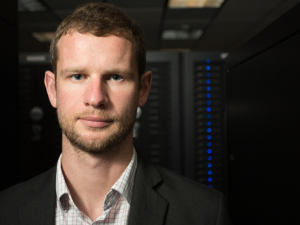Palmer uses programming experience to crack scientific stalemate
A scientific quest, started with genuine curiosity and a passion for research, turned into a Hatfield-McCoy style feud that lasted seven years.
This legendary dispute and the man who finally resolved it – Jeremy Palmer, assistant professor of chemical and biomolecular engineering at the UH Cullen College of Engineering – are featured in an article titled “The war over supercooled water” published in Physics Today.
The beginning
Two teams of researchers – one at Princeton University and the other at the University of California, Berkley – worked to answer the same fundamental question: What happens when liquid water is cooled far below its freezing point?
Water that’s free of dust and other impurities on which ice crystals can form can be supercooled tens of degrees below 0 degrees Celsius. But all water in liquid form, no matter how clean, crystallizes at about -40 degrees Celsius in experiments.
Both teams wanted to know what theoretical models predict water might look like at even colder conditions. Each came up with a different answer.
Initially, the two teams started to work together to resolve the issue. But after a year, no consensus had been reached and the relationship had soured – each side convinced its answer and methods were correct. So started a scientific dispute conducted mostly via journal publications and conference presentations.
The stalemate continued until Palmer, then assistant professor at UH, dove deep into the Berkeley team’s computer code and discovered the error in their calculations.
Palmer, who earlier this year won a National Science Foundation CAREER Award, said reproducibility is a key part of the research process. He is creating a short course for graduate and undergraduate researchers at the Cullen College focused on whether findings by one research group can be reproduced by another.
“It’s a huge issue,” Palmer said. “Eighty percent of the work out there is not reproducible to the extent it should be.”
“If it can’t be reproduced, it’s not science,” he said.
To read the entire saga, visit Physics Today at: https://physicstoday.scitation.org/do/10.1063/PT.6.1.20180822a/full/
